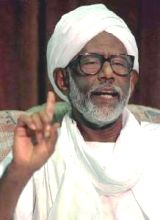Next Sudan’s president could be Christian – Turabi
June 6, 2006 (KHARTOUM) — Sudanese opposition leader Hassan al-Turabi said he has no problem with Sudan’s next president being a Christian or even a woman, claiming Islamic Sharia law has been perverted from its true meaning.
 Asked whether the long-divided nation’s next president could be a Christian, the Islamist Turabi said that neither religion nor sex mattered, as long as the candidate was honest.
Asked whether the long-divided nation’s next president could be a Christian, the Islamist Turabi said that neither religion nor sex mattered, as long as the candidate was honest.
“If I see a Christian candidate and I see he’s honest and can resist the corrupting influence of public office, he’s fair and won’t use his power against others, then I’ll vote for him,” he said.
“And I have no problem if it’s a woman.”
But, said the mercurial Turabi, the ruling National Congress Party of his former ally and current President Omar al-Beshir is unlikely to hold free elections that would allow such an event to happen, given the last vote held in 2000.
“Would you call that elections? Two-thirds of the seats were not contested and sometimes it took 10 minutes to count the votes for a whole region,” he alleged.
Shortly after the 2000 vote, Turabi was jailed for signing a memorandum of understanding with Sudan People’s Liberation Movement rebels, who hail largely from the Christian and animist south.
“People don’t understand what Sharia means. They think it’s a legal system, but it’s a way of life,” said the 74 year old.
“Prohibition should be personalized, as a Christian you can drink alcohol, but don’t manifest it too much and don’t sell it to Muslims, that’s about it actually. That’s Sharia.”
He says that true Sharia is also true democracy.
“Sharia tells us that government should be government of the people. There is no monarchy in Islam, there is no usurpation of power, power belongs to the people, if they want to appoint someone to govern them, he has to be elected.”
Turabi, who now heads his own opposition Popular Congress party, says that he is disappointed with the government of national unity that emerged from last year’s peace deal, which also exempted the south from Sharia.
“People thought that when the rebels are in power they will correct the balance of power, but that hasn’t happened. They’re not interested in national government, they’re focusing on the south.”
He says that insurgents from the Justice and Equality Movement, currently fighting government forces in the western Darfur region as well as increasingly in the east, are a better bet for Sudan’s future.
“On the ground they’re not at all powerful in Darfur, but they’re more intelligent, and they’re more national. They think about the whole country.”
While denying his reported links to the Islamist JEM, Turabi says that an increase in their attacks is likely ahead of peace talks for the east due to start in Asmara on June 13.
“They just want to assert themselves before they come to the negotiations, otherwise they are spoken to as an inferior. This is natural, all human beings are like that.”
Nevertheless, Turabi’s ideas are in many ways similar to those of the JEM, seeking a new form of Islamic democracy and rejecting the non-democratically elected caliphate system that predominated under early Islam.
“That was wrong. Everything is by consultation and it must be freedom for all, Muslims and non-Muslims. If someone attacks you with words, you must respond with words, if they attack your God, Allah, allow them to speak their minds.”
He even indicates it is possible for Muslims to convert to Christianity, an act that would usually bring a charge of apostasy and calls for the death penalty.
“God himself has allowed you that — he allowed us freedom to think. I mean water is subject to laws, if it’s 100 degrees it evaporates, if its zero degrees it becomes solid ice. But we are given some latitude.”
“God didn’t send angels to impose anything on us, so we are free to become a Muslim, to become a non-Muslim, to convert back.”
A Sufi Muslim, Turabi was already accused of apostasy earlier this year after saying that a Muslim woman could marry a Christian or a Jew and that her word has as much value as that of a Muslim man.
“Women should be engaged in fighting with us (men), in arts, in politics, in government, everywhere,” he said.
(ST)
